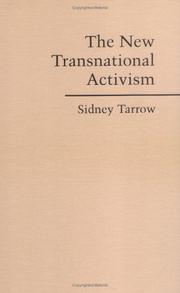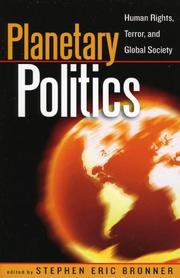| Listing 1 - 10 of 16 | << page >> |
Sort by
|
Book
ISBN: 2753587159 2753583633 Year: 2022 Publisher: Rennes : Presses Universitaires de Rennes,
Abstract | Keywords | Export | Availability | Bookmark
 Loading...
Loading...Choose an application
- Reference Manager
- EndNote
- RefWorks (Direct export to RefWorks)
Comment intériorise-t-on des normes et des valeurs qui nous sont extérieures ? Comment des processus sociohistoriques sont-ils incarnés par des individus et des institutions ? Posant ces questions fondamentales de la sociologie à un terrain difficile d’accès et des archives inédites, ce livre nous rappelle que l’objet sociologique est conquis plutôt que donné et inséparable de la reconstruction de son histoire. L’auteure y interroge l’internationalisme politique à travers le prisme de l’éducation. Comment le qualificatif « international », qui désignait depuis le milieu du xixe siècle les relations entre des États-nations, est-il venu à désigner dans l’entre-deux guerres une « mentalité » spécifique et l’intériorité même de certains individus ainsi symboliquement séparés de tous les autres ? Comment s’est construite la légitimité des écoles dites internationales ? Comment expliquer leur élitisme ? L’auteure répond à ces questions à partir du cas du baccalauréat international, diplôme privé de fin d’études secondaires chapeauté par une organisation à but non lucratif. C’est en examinant la construction sociohistorique des normes unifiant des lycées à l’échelle intercontinentale, au-delà de la diversité prônée, qu’elle offre des pistes pour expliquer leurs configurations actuelles. Ce livre offre une analyse inédite de ce que veut dire « être international » aujourd’hui.
Education --- éducation --- internationalisme --- baccalauréat --- education --- Education.
Book
ISBN: 2753503745 2753530122 Year: 2007 Publisher: Presses universitaires de Rennes
Abstract | Keywords | Export | Availability | Bookmark
 Loading...
Loading...Choose an application
- Reference Manager
- EndNote
- RefWorks (Direct export to RefWorks)
Petit-fils de Karl Marx, fils de Charles Longuet, communard proudhonien et ami de Clemenceau, neveu de Paul et Laura Lafargue, filleul laïque de Friedrich Engels, Jean Longuet est mêlé dès son plus jeune âge à la vie de la gauche politique et intellectuelle française comme à celle du socialisme international. Il côtoie Guesde, Jaurès, Blum, mais aussi Kautsky et les autres responsables de la social-démocratie, les socialistes russes, les travaillistes britanniques et les militants américains, ainsi que les nationalistes marocains ou syriens, entre autres… Journaliste, avocat, militant, responsable de la politique internationale de la SFIO, il est confronté aux principaux drames du xxe siècle : la guerre, la révolution, les dictatures. Ses références sont celles de Marx, mais vues et comprises comme s’intégrant à la tradition socialiste française, à l’image de l’effort accompli par Jaurès pour définir les principes et la politique d’un socialisme adapté aux conditions del’époque. À la tête d’un courant qui se veut à la fois pacifiste, patriote et internationaliste pendant la Grande Guerre, fondateur du Populaire, homme de l’unité socialiste et de la reconstruction, il est récusé par Lénine et les bolcheviks et ne peut empêcher la scission de Tours (1920). Député, maire de Châtenay-Malabry et conseiller général, il n’est pas pour autant un notable ordinaire. Il reste hostile à la domination coloniale et favorable à une politique de fermeté face aux puissances fascistes. « Le seul internationaliste de la SFIO » selon le propos moqueur d’un contradicteur ? En tout cas, un militant qui cherche à « penser internationalement » et à inventer la pratique politique du socialisme en démocratie et en république.
Political Science --- Law, Politics & Government --- Socialism, Communism & Anarchism --- Longuet, Jean. --- Longe, Zhan --- Longe, Zh. --- gauche politique --- biographie --- homme politique --- socialisme --- internationalisme
Book
ISBN: 9781107021136 1107021138 9781139108584 1139108581 9781107640948 1139540122 1107231450 128352211X 1139527339 9786613834560 1139526138 1139531999 1139530801 1139528521 9781139526135 9781139528528 9781283522113 9781139540124 9781107231450 9781139527330 6613834564 9781139531993 9781139530804 1107640946 Year: 2012 Publisher: Cambridge Cambridge University Press
Abstract | Keywords | Export | Availability | Bookmark
 Loading...
Loading...Choose an application
- Reference Manager
- EndNote
- RefWorks (Direct export to RefWorks)
Chronicling the emergence of an international society in the 1920s, Daniel Gorman describes how the shock of the First World War gave rise to a broad array of overlapping initiatives in international cooperation. Though national rivalries continued to plague world politics, ordinary citizens and state officials found common causes in politics, religion, culture and sport with peers beyond their borders. The League of Nations, the turn to a less centralized British Empire, the beginning of an international ecumenical movement, international sporting events and audacious plans for the abolition of war all signaled internationalism's growth. State actors played an important role in these developments and were aided by international voluntary organizations, church groups and international networks of academics, athletes, women, pacifists and humanitarian activists. These international networks became the forerunners of international NGOs and global governance.
Internationalism --- International cooperation --- Internationalisme --- Coopération internationale --- History --- Histoire --- Coopération internationale --- Intellectual cooperation --- Cosmopolitanism --- International education --- Nationalism --- Cooperation, International --- Global governance --- Institutions, International --- Interdependence of nations --- International institutions --- World order --- Cooperation --- International relations --- International organization --- Arts and Humanities

ISBN: 0691124639 9780691124636 9780691136257 9786612086816 1282086812 1400827221 0691136254 9781400827220 6612086815 9781282086814 Year: 2006 Publisher: Princeton, N.J. Princeton University Press
Abstract | Keywords | Export | Availability | Bookmark
 Loading...
Loading...Choose an application
- Reference Manager
- EndNote
- RefWorks (Direct export to RefWorks)
In Reluctant Crusaders, Colin Dueck examines patterns of change and continuity in American foreign policy strategy by looking at four major turning points: the periods following World War I, World War II, the Cold War, and the 9/11 terrorist attacks. He shows how American cultural assumptions regarding liberal foreign policy goals, together with international pressures, have acted to push and pull U.S. policy in competing directions over time. The result is a book that combines an appreciation for the role of both power and culture in international affairs. The centerpiece of Dueck's book is his discussion of America's "grand strategy"--the identification and promotion of national goals overseas in the face of limited resources and potential resistance. One of the common criticisms of the Bush administration's grand strategy is that it has turned its back on a long-standing tradition of liberal internationalism in foreign affairs. But Dueck argues that these criticisms misinterpret America's liberal internationalist tradition. In reality, Bush's grand strategy since 9/11 has been heavily influenced by traditional American foreign policy assumptions. While liberal internationalists argue that the United States should promote an international system characterized by democratic governments and open markets, Dueck contends, these same internationalists tend to define American interests in broad, expansive, and idealistic terms, without always admitting the necessary costs and risks of such a grand vision. The outcome is often sweeping goals, pursued by disproportionately limited means.
Coexistence --- Coëxistence pacifique --- Foreign affairs --- Foreign policy --- Interdependence of nations --- International relations --- Internationale betrekkingen --- Internationalism --- Internationalisme --- Ordre mondial --- Peaceful coexistence --- Relations internationales --- Vreedzame coëxistentie --- Wereldorde --- World order --- United States --- Foreign relations --- International relations. --- Internationalism. --- Foreign relations. --- Global governance --- International affairs --- Intellectual cooperation --- International cooperation --- Cosmopolitanism --- International education --- Nationalism --- National security --- Sovereignty --- World politics --- United States - Foreign relations
Book
ISBN: 1283119862 9786613119865 9004188487 9789004188488 9789004188495 9004188495 9004250557 9789004250550 Year: 2010 Publisher: Leiden Boston
Abstract | Keywords | Export | Availability | Bookmark
 Loading...
Loading...Choose an application
- Reference Manager
- EndNote
- RefWorks (Direct export to RefWorks)
Narratives of anarchist and syndicalist history during the era of the first globalization and imperialism (1870-1930) have overwhelmingly been constructed around a Western European tradition centered on discrete national cases. This parochial perspective typically ignores transnational connections and the contemporaneous existence of large and influential libertarian movements in Africa, Asia, Latin America, and Eastern Europe. Yet anarchism and syndicalism, from their very inception at the First International, were conceived and developed as international movements. By focusing on the neglected cases of the colonial and postcolonial world, this volume underscores the worldwide dimension of these movements and their centrality in anti-colonial and anti-imperialist struggles. Drawing on in-depth historical analyses of the ideology, structure, and praxis of anarchism/syndicalism, it also provides fresh perspectives and lessons for those interested in understanding their resurgence today. Contributors are Luigi Biondi, Arif Dirlik, Anthony Gorman, Steven Hirsch, Dongyoun Hwang, Geoffroy de Laforcade, Emmet O'Connor, Kirk Shaffer, Aleksandr Shubin, Edilene Toledo, and Lucien van der Walt. With a foreword by Benedict Anderson.
Anarchism --- Anti-imperialist movements --- Internationalism. --- National liberation movements --- Revolutions and socialism --- Syndicalism --- Social movements --- Labor unions --- Anarchism and anarchists --- Anarchy --- Government, Resistance to --- Libertarianism --- Nihilism --- Socialism --- Intellectual cooperation --- International cooperation --- Cosmopolitanism --- International education --- Nationalism --- Anti-colonialism --- Antiimperialist movements --- Imperialism --- Liberation movements, National --- Revolutions --- Socialism and revolutions --- Anarchisme --- Syndicalisme --- Anti-impérialisme --- Mouvements de libération nationale --- Internationalisme --- History. --- History --- Histoire
Book

ISBN: 2367813884 2367812209 Year: 2021 Publisher: Montpellier : Presses universitaires de la Méditerranée,
Abstract | Keywords | Export | Availability | Bookmark
 Loading...
Loading...Choose an application
- Reference Manager
- EndNote
- RefWorks (Direct export to RefWorks)
Reflet des débats actuels dans les champs croisés des Études afro-américaines et des Études diasporiques, ces essais critiques et études de cas explorent l’articulation entre les concepts fluctuants de « race » et de diaspora et les négociations des identités au-delà des différences. Ils étudient tour à tour l’évolution de l’(inter)nationalisme noir au sein de la Diaspora, les nouveaux discours sur la post-racialité et la notion de « postblackness », la conscience raciale chez les soldats afro-américains, l’expatriation et la re-diasporisation. Le constat d’un rejet de l’africanité au sein de sociétés telles que les Émirats, le Maroc ou la République dominicaine entre en relation avec les analyses d’œuvres d’art au prisme d’une conscience diasporique et de textes littéraires qui disent l’internationalisme ou subvertissent la notion de « race ». James Baldwin dialogue alors avec Percival Everett. Reflecting current debates in the intersecting fields of African American Studies and African Diaspora, these critical essays and case studies explore the articulation between the fluctuating concepts of ‘race’ and Diaspora and the negotiations of identities across differences. They examine in turn the developments of diasporic black (inter)nationalism, new discourses on ‘postraciality’ and ‘postblackness’, race consciousness among African American soldiers, expatriation and re-diasporization. The acknowledgement of a rejection of Africanness in societies such as the Emirates, Morocco or the Dominican Republic dialogues with examinations of artwork through the lenses of a diasporic consciousness and analyses of literary texts that celebrate internationalism or subvert the notion of ‘race’. James Baldwin thus converses with Percival Everett.
Social Issues --- race --- études afro-américaines --- diaspora noire --- afrique noire --- post-racialité --- postblackness --- identité afro-américaine --- identité noire --- expatriation --- afro-américaine --- internationalisme noir --- African-American studies --- Black diaspora --- Black Africa --- post-raciality --- post-blackness --- African-American identity --- Black identity --- African-American --- Black internationalism

ISBN: 0521851300 0521616778 9780521851305 9780521616775 9780511791055 0511791054 9780511350221 0511350228 0511348959 9780511348952 9781281085825 1281085820 1107154111 9786611085827 0511350651 0511347839 0511568185 Year: 2009 Publisher: Cambridge Cambridge University Press
Abstract | Keywords | Export | Availability | Bookmark
 Loading...
Loading...Choose an application
- Reference Manager
- EndNote
- RefWorks (Direct export to RefWorks)
The New Transnational Activism, first published in 2005, shows how even the most prosaic activities can assume broader political meanings when they provide ordinary people with the experience of crossing transnational space. This means that we cannot be satisfied with defining transnational activists through the ways they think. The defining feature of transnationalism in this book is relational, and not cognitive. This emphasis on activism's relational structure means that even as they make transnational claims, transnational activists draw on the resources, the networks, and the opportunities in which they are embedded, and only then - if at all - on more distant transnational links. But we can no more sharply draw a line between domestic and international politics in studying transnational activism than we could ignore local politics in studying its national equivalent. Understanding the processes that link the local, the national and the international is the major undertaking of the book.
Internationalism --- Coalition (Social sciences) --- Political activists --- Transnationalism --- Internationalism. --- Coalitions --- Political activists. --- Transnationalism. --- Coalitions. --- Coalition (Social sciences). --- Social change --- Community organization --- International movements --- #SBIB:324H73 --- #SBIB:324H74 --- Trans-nationalism --- Transnational migration --- International relations --- Activists, Political --- Political participation --- Intellectual cooperation --- International cooperation --- Cosmopolitanism --- International education --- Nationalism --- Social groups --- Politieke verandering: oppositie en minderheid, protest, politiek geweld --- Politieke verandering: sociale bewegingen --- Persons --- Social Sciences --- Political Science --- Activités politiques --- Internationalisme --- Transnationalisme
Book
ISBN: 9068324209 Year: 2006 Publisher: Amsterdam Koninklijk Instituut voor de Tropen
Abstract | Keywords | Export | Availability | Bookmark
 Loading...
Loading...Choose an application
- Reference Manager
- EndNote
- RefWorks (Direct export to RefWorks)
Land en bevolking - geschiedenis en politiek - samenleving - economie - cultuur
Geografie --- Landenreeks. --- Brazil. --- Regional documentation --- Brazil --- Brazilië --- Sociale aardrijkskunde --- Economische aardrijkskunde --- Politiek --- Geschiedenis --- Toerisme --- Latijns-Amerika --- Cultuur --- 282 Landbeschrijvingen (sociaal-economisch-cultureel) --- landenreeksen --- Amazonewoud --- Bevolking --- Brazilië 991 --- Carnaval --- Dansen --- Economie --- Gezondheidszorg --- Kunst --- Onderwijs --- Samenleving --- reisgidsen --- Brazilië 994 --- Brazilië ; sociaal-economische beschrijvingen --- Internationalisme --- S20080293.JPG --- derdewereldlanden --- (zie ook: jazzdans) --- (zie ook: beroepseconomie) --- (zie ook: teleonderwijs) --- 408 --- 402 --- Geneeskunde --- Techniek (wetenschap) --- Atlas --- Museum --- Maatschappij --- Film --- 983 --- geografie Amerika --- géographie Amérique --- Brazilië.
Book
ISBN: 9789068324228 Year: 2007 Volume: *111 Publisher: Amsterdam KIT
Abstract | Keywords | Export | Availability | Bookmark
 Loading...
Loading...Choose an application
- Reference Manager
- EndNote
- RefWorks (Direct export to RefWorks)
Guatemala. --- Geografie --- Landenreeks. --- Regional documentation --- Gambia --- Senegal --- Population --- Description and travel --- 282 Landbeschrijvingen (sociaal-economisch-cultureel) --- landenreeksen --- land- en volkenkunde --- 916.65 --- reisgidsen --- 908 <663> --- 908 <665.1> --- 916.63 --- 916.651 --- Gambia 994 --- Senegal 994 --- Afrika --- Internationalisme --- S20080292.JPG --- West-Afrika ; sociaal-economische beschrijvingen --- derdewereldlanden --- 908 <663> Heemkunde. Area studies--Senegal --- Heemkunde. Area studies--Senegal --- Gambia, Guinee, Guinee-Bissau, Kaapverdische eilanden --- Heemkunde. Area studies--Gambia --- Aardrijkskunde van Senegal --- Aardrijkskunde van Gambia --- 406 --- 402 --- Sociale aardrijkskunde --- Economische aardrijkskunde --- Politiek --- Geschiedenis --- Toerisme --- Senegal (land) --- Geneeskunde --- Techniek (wetenschap) --- Atlas --- Museum --- Maatschappij --- Film --- 982 --- geografie Afrika --- géographie Afrique


ISBN: 0742541983 0742541991 1461640938 9781461640936 9780742541986 Year: 2005 Publisher: Lanham Rowman & Littlefield Publishers
Abstract | Keywords | Export | Availability | Bookmark
 Loading...
Loading...Choose an application
- Reference Manager
- EndNote
- RefWorks (Direct export to RefWorks)
Global society has been analyzed in any number of ways: books dealing with its economic and cultural implications flood the market. But Planetary Politics highlights something unique. It explores globalization with an eye on the transformation of politics into a planetary enterprise. Bringing together the work of major scholars with national and international reputations, this exciting new work offers perspectives for dealing with the complexity of power in the planetary life of the new millennium.
Globalization. --- Terrorism. --- Human rights. --- Internationalism. --- Mondialisation --- Terrorisme --- Droits de l'homme (Droit international) --- Internationalisme --- United States --- Etats-Unis --- Foreign relations --- Relations extérieures --- Relations extérieures --- Acts of terrorism --- Attacks, Terrorist --- Global terrorism --- International terrorism --- Political terrorism --- Terror attacks --- Terrorist acts --- Terrorist attacks --- World terrorism --- Global cities --- Globalisation --- Internationalization --- Basic rights --- Civil rights (International law) --- Human rights --- Rights, Human --- Rights of man --- Law and legislation --- Intellectual cooperation --- International cooperation --- Cosmopolitanism --- International education --- Nationalism --- Direct action --- Insurgency --- Political crimes and offenses --- Subversive activities --- Political violence --- Terror --- International relations --- Anti-globalization movement --- Human security --- Transitional justice --- Truth commissions
| Listing 1 - 10 of 16 | << page >> |
Sort by
|

 Search
Search Feedback
Feedback About UniCat
About UniCat  Help
Help News
News